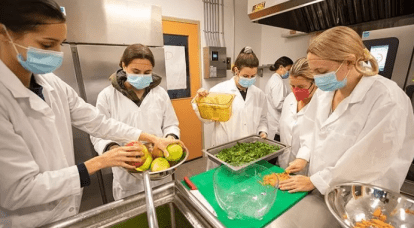
A unique-in-Canada program offered at StFX that brings together students in the Gerald Schwartz School of Business and the Human Nutrition Department continues to grow.
StFX is now offering a five-year, two-degree option that provides an opportunity for students to study both business and nutrition—and to earn two degrees over five years while gaining integrated learning experiences. The program builds on a track record of entrepreneurial collaboration between students in both disciplines.
“This will be attractive to students interested in expanding their knowledge and skill base, adding a second credential, and opening new career pathways,” says Schwartz School entrepreneurship professor Dr. Neil Maltby.
Dr. Maltby says arriving at this stage is a testament to the collaboration between the Department of Human Nutrition and the Gerald Schwartz School of Business.
“For years, students in both programs would pitch and develop ideas that spanned the business of food and nutrition. Creating a curricular pathway was the logical next step.”
Dr. Ann Fox, chair of the Department of Human Nutrition, says the impact of COVID-19 on global and local food systems is evidence of the need for innovation across sectors to ensure access to nourishing food.
“Our current food supplies are affected by climate change, war, urbanization, inflationary pressures, and threats to the family farm. Add to that our rapidly evolving understanding of how nutrition affects health, and it’s vital that students from different disciplines come together to think critically about solutions. This program offers students a unique opportunity to do this,” she says.
Dynamic Learning
Erica Cameron just completed her first year in the program, which she says appealed to her for the integrated knowledge and skills as well as the dynamic learning experience.
"Combining my passion for business and nutrition, the five-year, double degree option at StFX was an unexpected but incredible find. No other university in Canada provides such a unique program and no other school, in my humble opinion, can offer what I have experienced first-hand in my first year at StFX,” she says.
“Small class sizes, personal relationships with knowledgeable professors who are invested in my success and supportive of my effort to pursue my entrepreneurial goals, opportunities to collaborate, innovate and solve real-world problems with like-minded peers, inspiring events and engaging societies that are aimed to broaden student understanding of the business world and provide occasions for networking … all the while being embraced by a warm, welcoming, and spirited school community."
Business and Nutrition
The business component of the program focuses on the study and practice of entrepreneurship, a dynamic way of thinking and acting that capitalizes on opportunities with innovation to create value and solve problems. The nutrition component focuses on food and nutrition science, the food industry, food safety and regulations, and the central role of food in health promotion and disease prevention.
Dr. Maltby says that students develop knowledge and skills related to new business modelling and innovative design, start-up data analysis, financial analysis, and the dynamic communication needed to launch a start-up or work in a new, growing venture.
From a science perspective, students develop skills in food processing, sensory evaluation, food provision, nutrition education, evidence-based practice, and food product development, including eco-friendly packaging applications.
Opportunities for graduates of the food and nutrition entrepreneurship stream include launching new start-ups and social enterprises and/or work in existing start-ups and small-and-medium-sized enterprises. Other career opportunities include working in the start-up financing sector, the service industry for start-ups such as incubator/accelerator programs, or working in the public sector with a focus on small business, as well as in larger organizations with a focus on innovation.

Dr. Fox says this innovative partnership will build on the strong local food movement and recent opening of Antigonish Farmer’s Market commercial kitchen.
Currently, nutrition students, with food safety certification, partner with the Farmer’s Market to plan, cost, locally source, prepare, market and implement community meals.
The commercial kitchen provides opportunities to use state-of-the-art industry equipment to develop, test and produce products that can be safely exported to markets beyond Nova Scotia, she says.
“The relationship building that occurs with local food vendors also acts as an incubator for food product development and health promotion ideas. The Farmer’s Market aims to support local vendors in packaging and distributing more products to wider markets. Thus, there is a natural fit for business and nutrition students to work together toward this goal.”
She says growing demand for local food products has seen a boom in local, small-scale farming operations with food box delivery, food stands, and other innovations. Sobeys Inc., which originated in nearby Pictou County, increasingly adds and promotes locally sourced foods. Peace by Chocolate, an Antigonish chocolate company founded by Syrian refugees, is gaining national and international attention for their social entrepreneurship. “Indeed, the Nova Scotia government launched a Buy Local program in 2022 and is piloting projects to improve healthy, local food access to schools and long-term care facilities in the province. The aim is to have 20 per cent of all food purchases by Nova Scotians to be grown or produced in Nova Scotia by 2030.”
Dr. Maltby says this initiative can support local economies while also enhancing food security and access to healthy foods. “Thus, there is a need to produce and retain graduates with skills and knowledge in food, small business and entrepreneurship to meet this call.”
For more information on the program, please see here and here.

